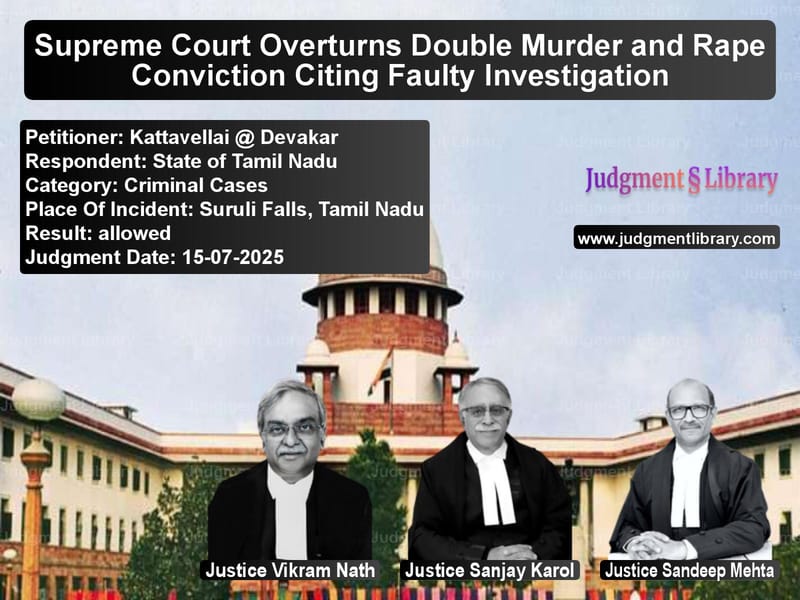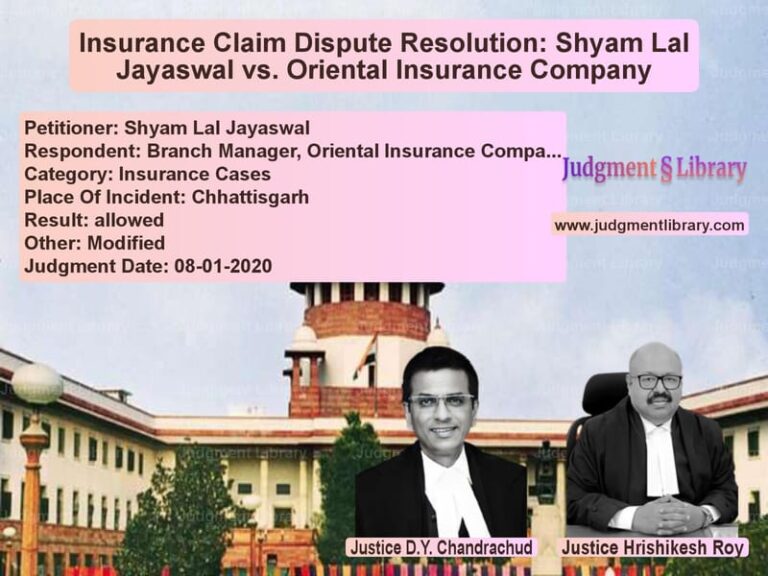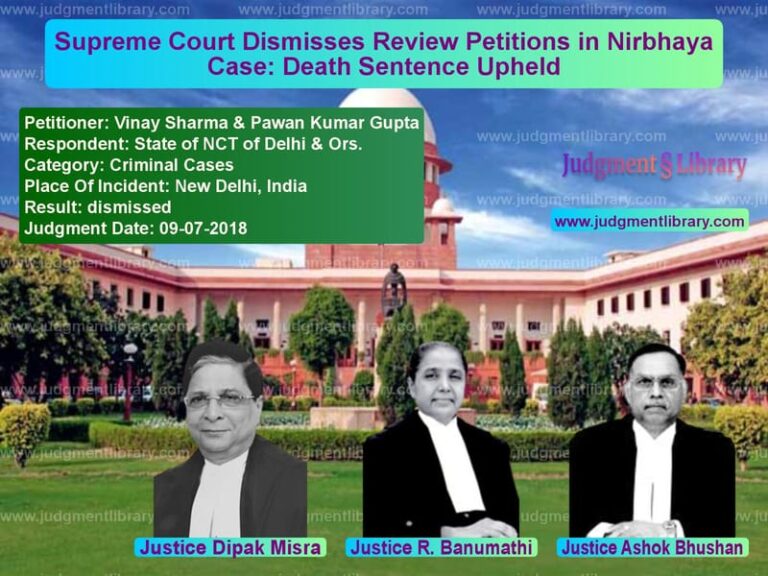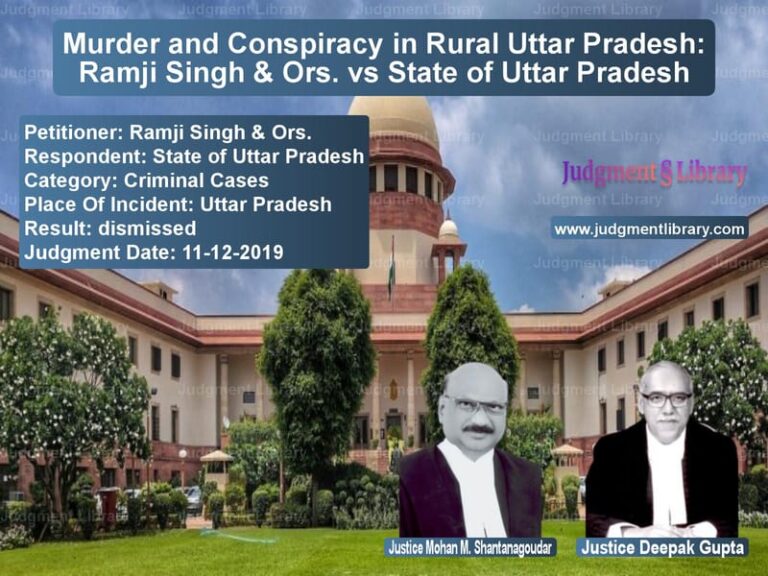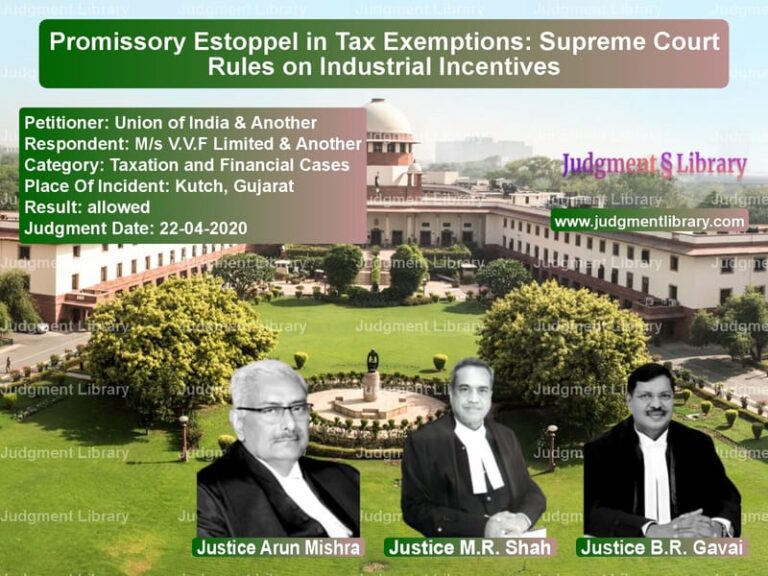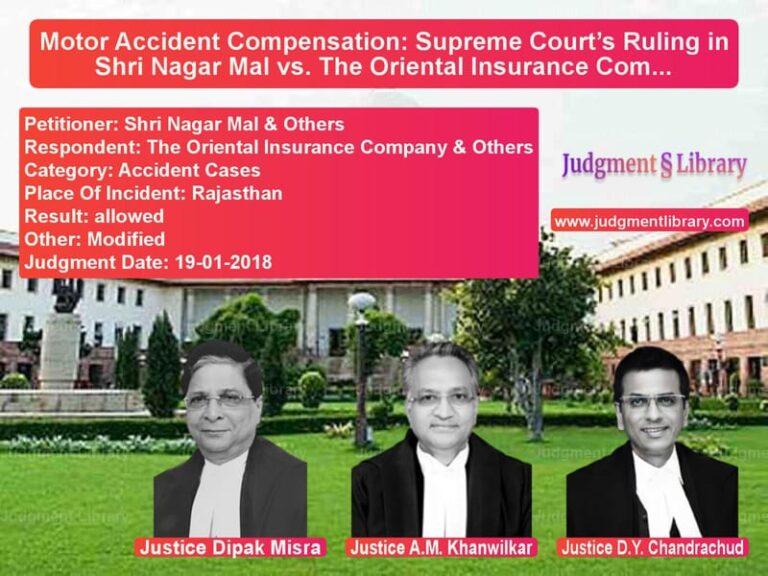Supreme Court Overturns Double Murder and Rape Conviction Citing Faulty Investigation
In a dramatic turn of events that highlights the critical importance of proper investigative procedures, the Supreme Court of India recently acquitted a man who had been sentenced to death for the brutal murder of two young lovers and the rape of the female victim. The case, which had stretched over 14 years, saw Kattavellai @ Devakar walk free after the Court found glaring lapses in the investigation that formed the basis of his conviction. The judgment serves as a stark reminder that even the most heinous crimes must be proven beyond reasonable doubt through proper legal procedures.
The tragic incident dates back to May 14, 2011, when two young people – Ezhil Muthalvan and his companion Kasturi – visited Suruli Falls in Tamil Nadu. Unbeknownst to their families, the young couple had gone to the popular meeting spot, where their lives would tragically end. Their decomposed bodies were discovered five days later in the forest area, bearing horrific injuries that pointed to a violent end. The female victim showed signs of sexual assault, adding another layer of brutality to the crime.
The prosecution’s case rested entirely on circumstantial evidence, with no eyewitnesses to the actual crime. The trial court and later the High Court had convicted Kattavellai based on several circumstances including the last seen theory, recovery of material objects, DNA evidence, and test identification parade. However, the Supreme Court found each of these pillars of the prosecution’s case to be fundamentally flawed.
The Last Seen Theory and Witness Reliability
The prosecution heavily relied on PW-5, who claimed to have seen the accused with the victims on the day of the incident. This witness stated that the accused had first approached him and his companion Bhagyalakshmi, demanding jewellery, and then moved toward the victims. However, the Court found his testimony full of inconsistencies and unnatural conduct.
The witness remained silent from May 14 to May 20, 2011, without reporting the threatening incident or the victims’ disappearance to anyone. The Court noted: “The examination that we must undertake is whether the act of PW-5 satisfies this understanding. Certain questions, therefore, arise. First and foremost, why did he not inform anyone about the occurrence between the 14th and the 20th; Second, having seen that the Appellant-convict was threatening D1 and D2, and finding that D1 did not pick up the phone when this witness called after coming down the hill-ordinarily should have raised sufficient concern in PW-5 to have taken further steps… yet again there was no action on part of PW-5 – In fact, stoic silence, any which way.”
The Court further observed: “Knowing both the victims, having seen them be threatened, finding them missing from everyday activity and even out of contact, and yet not even uttering so much as a whisper to anybody, is hard to conceive as reasonable.”
Arrest and Confession Under Cloud
The circumstances surrounding the appellant’s arrest raised serious questions. The prosecution claimed they arrested him “taking cue” from PW-5’s statement, but the record was unclear about what exactly led them to suspect Kattavellai. The Court noted that the arrest itself was cast under serious doubt since the circumstances leading to the same are missing from the record.
Regarding the confession statements, the Court reiterated established legal principles: “It is a settled principle of law that extra-judicial confession is a weak piece of evidence. It has been held that where an extra-judicial confession is surrounded by suspicious circumstances, its credibility becomes doubtful and it loses its importance.”
The Court found the confessions unreliable, noting the absence of independent witnesses and the mysterious recording of a second confession more than a year after the offense without any justification.
Recovery of Evidence
The recovery of various objects, including a sickle, clothes, and a gold chain, at the instance of the accused also failed to impress the Court. The sickle, allegedly the murder weapon, was never sent for forensic examination. The clothes showed no traces of blood or semen. The gold chain, while identified by the victim’s parents, was described by witnesses as a commonly available design.
The Court emphasized: “Incontrovertibly, where the prosecution fails to inspire confidence in the manner and/or contents of the recovery with regard to its nexus to the alleged offence, the court ought to stretch the benefit of doubt to the accused.”
DNA Evidence Compromised
Perhaps the most significant failure in the investigation concerned the DNA evidence. The vaginal swabs collected from the female victim showed a match with the accused’s DNA, but the chain of custody had massive gaps that rendered the evidence unusable.
The samples were sent for analysis after a delay of 41 days without explanation. There was confusion about where the samples were stored during this period – with different witnesses claiming they were kept at the hospital, police station, or elsewhere. The Court noted: “Despite the presence of DNA evidence, it has to be discarded for the reason that proper methods and procedures were not followed in the collection, sealing, storage, and employment of the evidence.”
The Court issued detailed directions for handling DNA evidence in future cases, emphasizing proper documentation, timely transportation within 48 hours, and maintenance of a Chain of Custody Register.
Test Identification Parade Flaws
The Test Identification Parade (TIP) conducted nine days after the accused’s arrest was also found to be fundamentally flawed. The witness admitted that police had already informed him about the accused committing the crime and that he had seen the accused at the police station before the TIP.
The Court stated: “if the said witness had the opportunity to see the accused, in any form, after the incident the subject matter of testimony, but prior to the identification proceedings, it would render the same to be ineffective. Then, in our view, the courts below committed an error of elephantine proportions in considering these proceedings as forming one of the chains of circumstances against the Appellant-convict.”
Missing Witness and Unexplored Suspects
The prosecution’s failure to examine Bhagyalakshmi, who was present during the initial incident and was the link between PW-5 and the victims, was another critical flaw. The Court noted she could have provided essential testimony about the last seen theory and the relationship between the victims.
Additionally, the father of one victim had named four other suspects whose involvement was never properly investigated. The Court observed that the non-pursuance of these suspects was a circumstance against the prosecution case.
Conclusion and Acquittal
After meticulously examining each circumstance, the Supreme Court concluded: “We have no hesitation in holding that none of the circumstances posited by the prosecution are found to be conclusively proved against the Appellant-convict. The chain of circumstantial evidence in no way points to a singular hypothesis, that is the guilt of the accused, ruling out his innocence or involvement of none else in the crime.”
The Court acquitted Kattavellai and ordered his immediate release, noting that he had secured a “clean acquittal” where the conviction had “no legs to stand on whatsoever.” The judgment stands as a powerful affirmation that proper investigative procedures are not mere technicalities but essential safeguards to prevent miscarriage of justice, even in cases involving the most serious crimes.
Petitioner Name: Kattavellai @ Devakar.Respondent Name: State of Tamil Nadu.Judgment By: Justice Vikram Nath, Justice Sanjay Karol, Justice Sandeep Mehta.Place Of Incident: Suruli Falls, Tamil Nadu.Judgment Date: 15-07-2025.Result: allowed.
Don’t miss out on the full details! Download the complete judgment in PDF format below and gain valuable insights instantly!
Download Judgment: kattavellai-@-devaka-vs-state-of-tamil-nadu-supreme-court-of-india-judgment-dated-15-07-2025.pdf
Directly Download Judgment: Directly download this Judgment
See all petitions in Murder Cases
See all petitions in Rape Cases
See all petitions in Bail and Anticipatory Bail
See all petitions in Custodial Deaths and Police Misconduct
See all petitions in Fraud and Forgery
See all petitions in Judgment by Vikram Nath
See all petitions in Judgment by Sanjay Karol
See all petitions in Judgment by Sandeep Mehta
See all petitions in allowed
See all petitions in supreme court of India judgments July 2025
See all petitions in 2025 judgments
See all posts in Criminal Cases Category
See all allowed petitions in Criminal Cases Category
See all Dismissed petitions in Criminal Cases Category
See all partially allowed petitions in Criminal Cases Category

